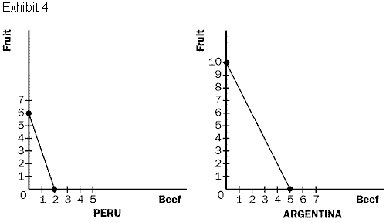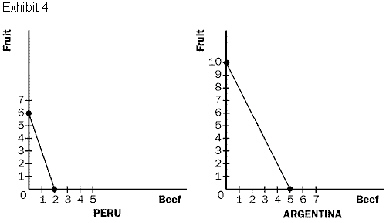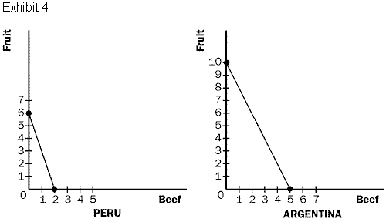True/False
Indicate whether the
sentence or statement is true or false.
|
|
|
1.
|
If Japan has an absolute advantage in the
production of an item, it must also have a comparative advantage in the production of that
item.
|
|
|
2.
|
Comparative advantage, not absolute advantage,
determines the decision to specialize in production.
|
|
|
3.
|
Absolute advantage is a comparison based on
productivity.
|
|
|
4.
|
Self-sufficiency is the best way to increase
one's material welfare.
|
|
|
5.
|
Comparative advantage is a comparison based on
opportunity cost.
|
|
|
6.
|
If a producer is self-sufficient, the production
possibilities frontier is also the consumption possibilities frontier.
|
|
|
7.
|
If a country's workers can produce 5
hamburgers per hour or 10 bags of French fries per hour, absent trade, the price of 1 bag of fries is
2 hamburgers.
|
|
|
8.
|
If producers have different opportunity costs of
production, trade will allow them to consume outside their production possibilities
frontiers.
|
|
|
9.
|
If trade benefits one country, its trading partner
must be worse off due to trade.
|
|
|
10.
|
Talented people that are the best at everything
have a comparative advantage in the production of everything.
|
|
|
11.
|
The gains from trade can be measured by the
increase in total production that comes from specialization.
|
|
|
12.
|
When a country removes a specific import
restriction, it always benefits every worker in that country.
|
|
|
13.
|
If Germany's productivity doubles for
everything it produces, this will not alter its prior pattern of specialization because it has not
altered its comparative advantage.
|
|
|
14.
|
If an advanced country has an absolute advantage in
the production of everything, it will benefit if it eliminates trade with less developed countries
and becomes completely self-sufficient.
|
|
|
15.
|
If gains from trade are based solely on comparative
advantage, and if all countries have the same opportunity costs of production, then there are no
gains from trade.
|
Multiple Choice
Identify the
letter of the choice that best completes the statement or answers the question.
|
|
|
16.
|
If a nation has an absolute advantage in the
production of a good,
a. | it can benefit by restricting imports of that
good. | b. | it will specialize in the production of that good and
export it. | c. | it can produce
that good using fewer resources than its trading partner. | d. | none of these answers. | e. | it can produce
that good at a lower opportunity cost than its trading
partner. |
|
|
|
17.
|
If a nation has a comparative advantage in the
production of a good,
a. | it can produce that good at a lower opportunity cost
than its trading partner. | b. | it can benefit by
restricting imports of that good. | c. | it can produce
that good using fewer resources than its trading partner. | d. | it must be the only country with the ability to produce that
good. | e. | none of these
answers. |
|
|
|
18.
|
Which of the following statements about trade is
true?
a. | Unrestricted international trade benefits every person
in a country equally. | b. | Trade can benefit
everyone in society because it allows people to specialize in activities in which they have a
comparative advantage. | c. | People that are
skilled at all activities cannot benefit from trade. | d. | Trade can benefit everyone in society because it allows people to specialize
in activities in which they have an absolute advantage. |
|
|
|
19.
|
According to the principle of comparative
advantage,
a. | countries should specialize in the production of goods
that they enjoy consuming. | b. | countries with a
comparative advantage in the production of every good need not specialize. | c. | countries should specialize in the production of goods for which they have a
lower opportunity cost of production than their trading partners. | d. | countries should specialize in the production of goods for which they use
fewer resources in production than their trading partners. |
|
|
|
20.
|
Which of the following statements is
true?
a. | A self-sufficient country can, at best, consume on its
production possibilities frontier. | b. | Only countries
with an absolute advantage in the production of every good should strive to be
self-sufficient. | c. | A self-sufficient
country consumes outside its production possibilities frontier. | d. | Self-sufficiency is the road to prosperity for most
countries. |
|
|
|
21.
|
Suppose a country's workers can produce 4
watches per hour or 12 rings per hour. If there is no trade,
a. | the domestic price of 1 ring is 1/4 of a
watch. | b. | the domestic price of 1 ring is 3
watches. | c. | the domestic price of 1 ring is 1/3 of a
watch. | d. | the domestic price of 1 ring is 12
watches. | e. | the domestic price of 1 ring is 4
watches. |
|
|
|
22.
|
Suppose a country's workers can produce 4
watches per hour or 12 rings per hour. If there is no trade,
a. | the opportunity cost of 1 watch is 1/4 of a
ring. | b. | the opportunity cost of 1 watch is 4
rings. | c. | the opportunity cost of 1 watch is 3
rings. | d. | the opportunity cost of 1 watch is 12
rings. | e. | the opportunity cost of 1 watch is 1/3 of a
ring. |
|
|
|
23.
|
Refer to Figure 3-1. Which of the following
statements about absolute advantage is true?

a. | Australia has an absolute advantage in the production of
food while Korea has an absolute advantage in the production of
electronics. | b. | Korea has an
absolute advantage in the production of food while Australia has an absolute advantage in the
production of electronics. | c. | Australia has an
absolute advantage in the production of both food and electronics. | d. | Korea has an absolute advantage in the production of both food and
electronics. |
|
|
|
24.
|
Refer to Figure 3-1. The opportunity cost of 1 unit
of electronics in Australia is

a. | 4 units of food. | b. | 5 units of food. | c. | 1/5 of a unit of
food. | d. | 1/4 of a unit of
food. |
|
|
|
25.
|
Refer to Figure 3-1. The opportunity cost of 1 unit
of electronics in Korea is

a. | 4 units of food. | b. | 1/4 units of food. | c. | 2 units of
food. | d. | 1/2 of a unit of
food. |
|
|
|
26.
|
Refer to Figure 3-1. The opportunity cost of 1 unit
of food in Australia is

a. | 1/5 of a unit of electronics. | b. | 5 units of electronics. | c. | 4 units of
electronics. | d. | 1/4 of a unit of
electronics. |
|
|
|
27.
|
Refer to Figure 3-1. The opportunity cost of 1 unit
of food in Korea is
a. | 1/2 of a unit of electronics. | b. | 1/4 units of electronics. | c. | 2 units of electronics. | d. | 4 units of
electronics. |
|
|
|
28.
|
Refer to Figure 3-1. Which of the following
statements about comparative advantage is true?
a. | Australia has a comparative advantage in the production
of both food and electronics. | b. | Korea has a
comparative advantage in the production of both food and electronics. | c. | Australia has a comparative advantage in the production of food while Korea
has a comparative advantage in the production of electronics. | d. | Korea has a comparative advantage in the production of food while Australia
has a comparative advantage in the production of electronics. | e. | Neither country has a comparative
advantage. |
|
|
|
29.
|
Refer to Figure 3-1. Korea
should
a. | specialize in electronics production, export
electronics, and import food. | b. | produce neither
good because it has an absolute disadvantage in the production of both
goods. | c. | produce both goods because neither country has a
comparative advantage. | d. | specialize in food
production, export food, and import electronics |
|
|
|
30.
|
Refer to Figure 3-1. Prices of electronics can be
stated in terms of units of food. What is the range of prices of electronics for which both countries
could gain from trade?
a. | The price must be greater than 1/5 of a unit of food but
less than 1/4 of a unit of food. | b. | The price must be
greater than 4 units of food but less than 5 units of food. | c. | The price must be greater than 1/4 of a unit of food but less than 1/2 of a
unit of food. | d. | The price must be
greater than 2 units of food but less than 4 units of food. |
|
|
|
31.
|
Suppose the world consists of two countries: the UK
and Spain. Further, suppose there are only two goods--food and clothing. Which of the following
statements is true?
a. | If the UK has an absolute advantage in the production of
food, then Spain must have an absolute advantage in the production of
clothing. | b. | none of these answers. | c. | If the UK has a comparative advantage in the production of food, Spain might
also have a comparative advantage in the production of food. | d. | If the UK has a comparative advantage in the production of food, it must also
have a comparative advantage in the production of clothing. | e. | If the UK has a comparative advantage in the production of food, then Spain
must have a comparative advantage in the production of
clothing. |
|
|
|
32.
|
Use the production possibilities frontiers in
Exhibit 4 to answer the question. Assume each country has the same number of workers, say 20 million,
and that each axis is measured in metric tons per month. Argentina has a comparative advantage in the
production of

a. | neither fruit nor beef. | b. | fruit. | c. | both fruit and
beef. | d. | beef. |
|
|
|
33.
|
Use the production possibilities frontiers in
Exhibit 4 to answer the question. Assume each country has the same number of workers, say 20 million,
and that each axis is measured in metric tons per month. Peru will export
a. | both fruit and beef. | b. | beef. | c. | fruit. | d. | neither fruit nor
beef. |
|
|
|
34.
|
Use the production possibilities frontiers in
Exhibit 4 to answer the question. Assume each country has the same number of workers, say 20 million,
and that each axis is measured in metric tons per month. The opportunity cost of producing a metric
ton of beef in Peru is
a. | 1/3 ton of fruit. | b. | 6 tons of fruit. | c. | 1 ton of
fruit. | d. | 2 tons of fruit. | e. | 3 tons of fruit. |
|
|
|
35.
|
Joe is a tax accountant. He receives €100 per
hour doing tax returns. He can type 10,000 characters per hour into spreadsheets. He can hire an
assistant who types 2,500 characters per hour into spreadsheets. Which of the following statements is
true?
a. | none of these answers. | b. | Joe should hire the assistant as long as he pays the assistant less than
€25 per hour. | c. | Joe should not
hire an assistant because the assistant cannot type as fast as he. | d. | Joe should hire the assistant as long as he pays the assistant less than
€100 per hour. |
|